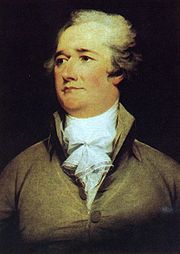
Federalist No. 17
Encyclopedia

Alexander Hamilton
Alexander Hamilton was a Founding Father, soldier, economist, political philosopher, one of America's first constitutional lawyers and the first United States Secretary of the Treasury...
, the seventeenth of the Federalist Papers
Federalist Papers
The Federalist Papers are a series of 85 articles or essays promoting the ratification of the United States Constitution. Seventy-seven of the essays were published serially in The Independent Journal and The New York Packet between October 1787 and August 1788...
. It was published on December 5, 1787 under the pseudonym
Pseudonym
A pseudonym is a name that a person assumes for a particular purpose and that differs from his or her original orthonym...
Publius, the name under which all the Federalist Papers were published. No. 17 addresses the failures of the Articles of Confederation
Articles of Confederation
The Articles of Confederation, formally the Articles of Confederation and Perpetual Union, was an agreement among the 13 founding states that legally established the United States of America as a confederation of sovereign states and served as its first constitution...
to satisfactorily govern the United States; it is the third of six essays on this topic. It is titled, "The Same Subject Continued: The Insufficiency of the Present Confederation to Preserve the Union."
Summary
Federalist No. 17 specifically regards the possible encroachment of the federal government on the powers of the state governments. Hamilton argues that because states are given the most direct power over their citizens, namely the ability to administer criminal and civil justice, they remain "the most attractive source of popular obedience and attachment." According to Hamilton this power contributes more than any other circumstance to impressing upon the minds of the people affection, esteem and reverence towards the government [of the state]."Furthermore Hamilton says human nature makes it so they are more closely attached to things they are geographically near, hence a person is more attached to their neighborhood than the community at large. Therefore "The people of each state would be apt to feel a stronger bias towards their local governments than towards the government of the union."
Because of the reasons listed, Hamilton believes that state governments will have the popular strength to resist encroachment on their state's rights.

